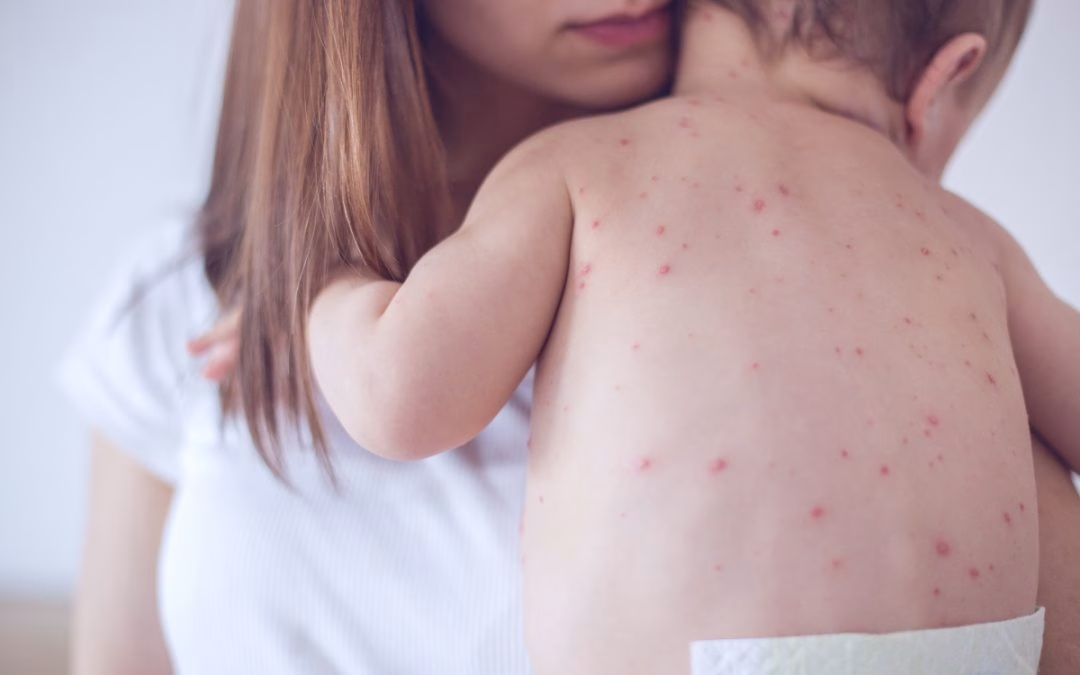
As spring blossoms across our community and local favorites like Milk and Honey fill with the hum of families enjoying their favorite coffees, there’s a growing concern that parents across the U.S. need to be aware of a resurgence of measles. While springtime brings warmer days and fun outings, health officials are sounding the alarm about an alarming increase in measles cases in various parts of the country, including Texas, Oklahoma, and New Mexico. As we enjoy the joys of family life, it’s important to stay informed about this highly contagious disease and understand how to protect our loved ones.
What Is Measles?
Measles, or rubeola, is a highly contagious viral infection that primarily targets the respiratory system. It spreads easily through the air when an infected person coughs, sneezes, or even breathes. The virus is so contagious that it can remain in the air for up to two hours after the infected person leaves the room. You don’t even need to touch someone to catch it, just being near them in a shared space is enough.
The disease often starts with symptoms similar to a cold, including:
- High fever (often over 101°F)
- Cough
- Runny nose
- Red eyes (a classic symptom called the “3 C’s”)
But what makes measles distinct is the development of Koplik spots: tiny white spots inside the mouth that appear before the rash. A red, blotchy rash then develops, typically beginning on the face and spreading downward over 3-5 days.
While measles is often thought of as a childhood illness, it can be dangerous for anyone, especially young children, pregnant women, and people with weakened immune systems. Complications of measles can be severe and include pneumonia, brain swelling (encephalitis), and, in some cases, death.
Why Is There a Measles Outbreak in 2025?
The primary cause of the 2025 measles outbreak can be traced to a decline in vaccination rates over the past several years. Although measles was officially declared eliminated in the United States in 2000, we are now seeing a resurgence in cases due to several factors, including:
- Vaccine Hesitancy: Misinformation about the safety and effectiveness of vaccines has led to many parents choosing not to vaccinate their children.
- Pandemic Disruptions: During the COVID-19 pandemic, many routine vaccinations were delayed or missed, leaving gaps in immunity.
- International Travel: Measles outbreaks in other countries can easily be brought into the U.S. by travelers, spreading quickly in communities with low vaccination rates.
When a large portion of the population is unvaccinated, measles can spread rapidly. In fact, if one person is infected, up to 90% of nearby unvaccinated individuals can contract the virus.
How Does Measles Spread?
Measles spreads in several ways:
- Airborne transmission: When an infected person coughs, sneezes, or even breathes, the virus is released into the air.
- Direct contact: Touching an infected person or their belongings, such as clothing or shared objects.
- Contact with contaminated surfaces: The virus can survive on surfaces for hours, and touching these surfaces can spread the virus to others.
Given its high contagion rate, even brief exposure to someone with measles in shared spaces, like a local store or restaurant, could lead to infection.
How Can You Protect Your Family?
While measles is highly contagious, it is also highly preventable through vaccination. The MMR vaccine (measles, mumps, and rubella) is safe and highly effective, with two doses offering about 97% protection against measles. The first dose is typically administered at 12–15 months of age, and the second dose is given between 4 and 6 years of age.
For parents, it’s important to ensure that children are up-to-date on their vaccinations, as this is the most effective way to prevent measles. In addition to vaccination, here are some other measures to help protect your family:
- Isolate those who are sick: If you suspect someone has measles, keep them isolated at home to prevent the virus from spreading.
- Hygiene: Wash hands frequently, disinfect surfaces, and wear a mask if you or your child shows symptoms.
- Monitor symptoms: Keep an eye on fever, cough, and rash. If you suspect measles, contact an AFC healthcare provider immediately.
How AFC Northshore Can Help
At our clinic, we are committed to keeping our community healthy. We offer the MMR vaccine to ensure you and your family are protected against measles. If you’re unsure whether your child is up-to-date on vaccinations, we can review their immunization records and provide guidance on any catch-up vaccinations they may need. Our team of healthcare providers is available to answer any questions you have about measles, vaccinations, or how to protect your loved ones from the virus.
You don’t have to wait for a long appointment, walk in or schedule an appointment at your convenience. We’re here to provide quick, professional care and keep your family safe.
Final Thoughts
As the 2025 measles outbreak continues to unfold, it’s crucial to stay informed and take the necessary steps to protect your family. Vaccination is the most effective way to prevent measles and ensure your children are safe. With the right precautions and timely action, we can protect our community and prevent the spread of this dangerous virus.
By staying vigilant, getting vaccinated, and seeking help from trusted healthcare providers like AFC Northshore, we can help keep our families healthy, happy, and safe. Remember, we’re here to support you every step of the way as we work together to ensure a measles-free future.
If you’re due for an MMR vaccination or have any concerns about measles, contact AFC Northshore today to learn more.